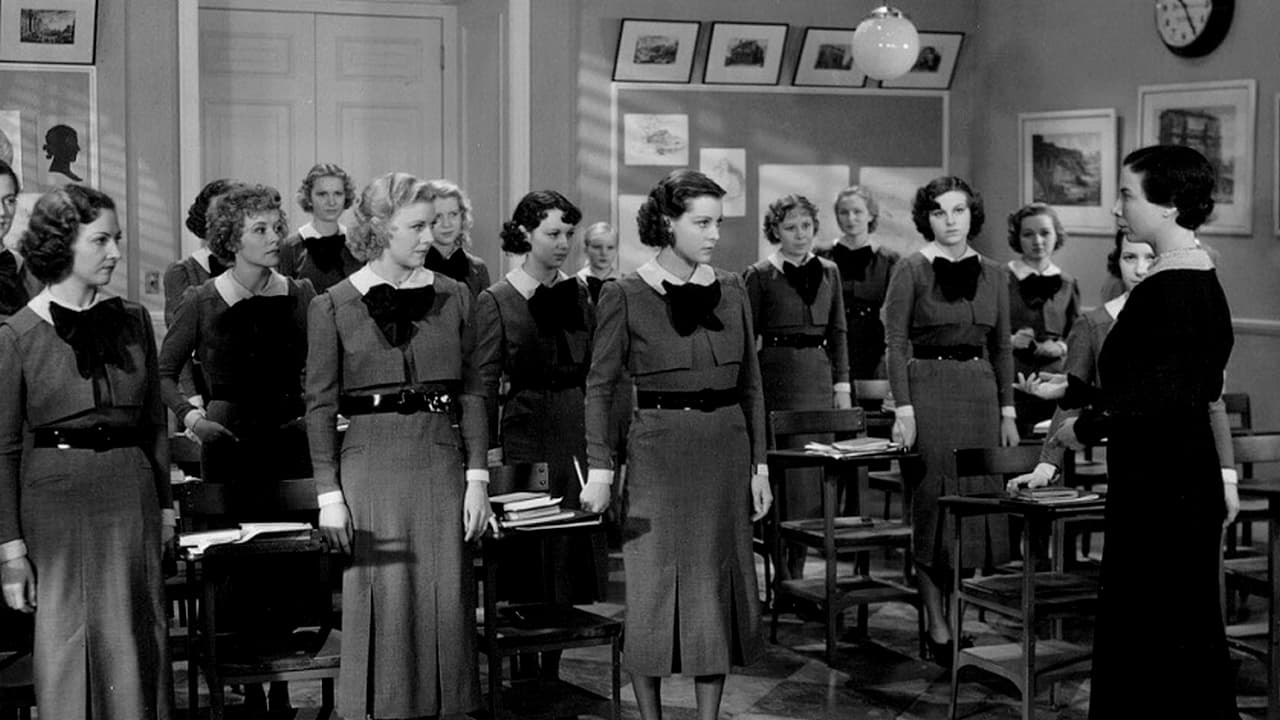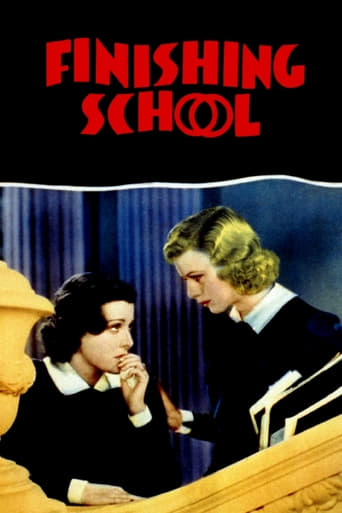Wordiezett
So much average
Konterr
Brilliant and touching
SeeQuant
Blending excellent reporting and strong storytelling, this is a disturbing film truly stranger than fiction
Aneesa Wardle
The story, direction, characters, and writing/dialogue is akin to taking a tranquilizer shot to the neck, but everything else was so well done.
vert001
Sound familial advice, indeed, but what I find most interesting about FINISHING SCHOOL is the contrasting character study it gives us between roommates Virginia (Frances Dee) and Pony (Ginger Rogers). Though quickly establishing a close friendship, they possess almost polar opposite personalities. Virginia is extremely high strung, as can be seen almost immediately. She spasmodically breaks a liqueur bottle to avoid breaking school rules even at the price of alienating her new schoolmates. When her boyfriend Mac (Bruce Cabot) is rudely turned away from a Sunday Tea at Crockett Hall, Vergie explodes rather unfairly at a young man to whom she's introduced at the social function. Later at her Christmas rendezvous with Mac, she tearfully asks him, no, she begs him to reassure her that she's really a "good" girl no matter what her teachers (Beulah Bondi) say. And at the end, her predicament drives Virginia to the verge of suicide. She's a girl who takes things very seriously, often too seriously for her own good.Her friend Pony, on the other hand, shows a devil-may-care attitude towards anything she encounters. School rules to her are not only made to be broken, this is actually the expected behavior from the girls. During their wild weekend in New York, Pony confidently tells her friend to "make the rules" and the football player will listen to them. It's no doubt true of Pony herself, but her innocent friend is completely at sea as to how to handle this aggressive young man (btw, exactly what has happened to Pony when Virginia is molested by the guy?). Much the same happens at the end when Virginia becomes frantic and hysterical at not hearing from Mac for a week while Pony immediately does the obvious and sensible thing by calling Mac on the telephone to explain to him the situation. It's not that Virginia isn't bright enough, it's that she's the kind to let her feelings overwhelm her, something that Pony would never do.Spoiler alert: I was rather embarrassed my first viewing of this film when I didn't figure out that Virginia was pregnant until she refused to be examined by the doctor (or was she just a nurse?). I understood that she'd slept with Mac in the boathouse that night, but I was thinking that Virginia's rising hysteria was just an overreaction to his apparently dumping her afterwards. Reading a few reviews of the movie told me that quite a few people never do pick up on the fact that she was pregnant. I still feel foolish, but perhaps a touch less so.It's a little strange to see Bruce Cabot in such a sympathetic role. He does well with it, though the character itself might be described as a bit too good to be true. Ginger Rogers is perfect as the sassy, somewhat rebellious schoolgirl, and is aided by having most of the best lines (though Billie Burke as Virginia's mother gets a few zingers as well), but the movie belongs to Frances Dee, who gives an exceptionally sensitive performance as an emotionally vulnerable adolescent going about the business of growing up. It's an interesting film from near the end of the Pre-Code era.
LeonLouisRicci
This was Made just a Heartbeat away from the Full Implementation of the Hays Code and it Confronts a Virginal, Pre-Marital Reproductive Concern that would be Totally Absent in just a Year and would be Virtually Gone from Cinema for Decades.The Third Act is Unimpeded by the Code and Francis Dee's "Situation" is a Result of Her Affair with Bruce Cabot . But that is Only One Facet of the Depression Era Societal Philosophies in this Dram-Com. The Income Inequality and Pompous Personalities of the Ruling Class Elite is Central to this Fine Film.Ginger Rogers Peppy Character Pony (wanna go for a ride?) is a Welcome Upbeat Relief from the Drama as the Movie is Brutal in its Display of Parental Disconnect and the Regimental and Stifling "Finishing" of Upper Crust Debutaunts. Their Hypocrisy and Hubris are Picked Apart and Pounced Upon in this Scathing Dismantling of the Heartless 1%.
atlasmb
The first indication that "Finishing School" is worth watching is that the Catholic church placed the film on its condemned list for 1934. But it has so much more than that to recommend it.The star of the film is Francis Dee, who plays Virginia Radcliff, the teenage daughter of rich parents who send her off to get educated in the finer aspects of life. The mother--played by Billie Burke--seems to have little use for the daughter and is quite happy to "drop her on the doorstep" and retire to her social agenda. Crockett Hall is an exclusive girls school where exclusivity implies a lack of racial diversity and an emphasis on blueblood backgrounds. At first the school seems like a backdrop for a film comedy about coming of age and the harmless hijinks of young women. But Virginia soon learns that Crockett is little more than a prison where the ridiculous rules of etiquette are but a small part of the personality engineering to which the girls are subjected.Virginia forges quality relationships with a small clique, including "Pony" Ferris, played by Ginger Rogers. Being a fan of Ms. Rogers, I was pleased to find that by this time in her career she is a fully-formed, competent actress. As the harsh headmistress, Miss Van Alstyne (played by Beulah Bondi), cracks down on the indiscretions of Virginia--especially the indiscretion of being "too different"--and we find that this teen comedy has morphed into a significant drama. Francis Dee is more than up to the challenge with her convincing portrayal of a woman who is fighting for her sanity and her life. Indeed, she raises Virginia to the level of heroine."Finishing School" is a stylish film with great acting. It deals with sophisticated issues and gives the viewer an emotional journey.
Greenster
Think about it: a Frances Dee, Ginger Rogers, Billie Burke, Beulah Bondi, Anne Shirley, Jane Darwell, Bruce Cabot film banned by the Catholic Church in 1934 over a theme treated as considerably tame within a matter of decades.Finishing School (RKO-Radio 1934), produced in January and February of that year, opens with a frame of an application accepting Virginia Radcliff (Frances Dee) to Crockett Hall Finishing School, this dated September, 1933.For some reason, Mrs. Helen Crawford Radcliff (Billie Burke) neglected to send away her now-young-adult daughter to her alma mater until she decides to embark upon travels with Mr. Frank S. Radcliff (John Halliday), who appears rarely here, while being granted no say in disobeying his scatterbrained society matron, a quintessential of Miss Burke's film career.Upon her arrival at snobbish Crockett Hall (This institution is thusly billed as a character reminiscent of the Hawthornian Gothic novel), Virginia complaisantly agrees to heed the do's and don't outlined by stern and proper Miss Van Alstyne (Beulah Bondi, made up to appear elder than her current age and less sympathetic than her typical characters although Miss Bondi conveys a degree of likability in developing her character here).When Virginia is introduced to her new roommate, Cecilia "Pony" Ferris (Ginger Rogers), Virginia expresses surprise that Cecilia, along with the "in-crowd," Ruth Wallace (Marjorie Lytell) and Madeleine Kelly (Adalyn Doyle) not only know the ropes, but pull them at every possible turn. Young Billie (Anne Shirley, billed as Dawn O'Day) cries to fit in with this "mature" set, but remains largely overlooked (but accepted as a pal to Cecilia--a role which Miss Rogers fans come to admire).Cecilia sticks up for Virginia, who--to the dismay of Ruth and Madeleine--breaks the bottle of liquor which she had smuggled into Crockett Hall with the notion to conform to Miss Van Alstyne's edict.But after Virginia accompanies Cecilia and her "Aunt Jessica" (Irene Franklin) upon an outing to the city, the tables turn upon her desires to choose "right" over "wrong." As she attempts to escape the clutches of a forcible escort, a hotel night busboy, Ralph McFarland (Bruce Cabot), rises to the occasion of returning Virginia unto Crockett Hall, at which point both she and Ralph tread into steaming puddles back at the Finishing School campus, for doing what the viewer realizes is perfectly acceptable conduct.Dr. Ralph McFarland, an intern at a city hospital, exchanges barbs with Nurse Maude (Jane Darwell) and a milkman in this script resplendent with fast-paced wisecracking (also a hallmark of Ginger's character here) throughout much of this film, which efficiently segues into a subliminal study of Miss Dee's character, whose very mind proves a battlefield between right and wrong in near "Capraesque" fashion.P.S. In a dormitory scene, Ginger also performs a song which she has reportedly composed: "Never Hit Your Grandma with a Shovel."

